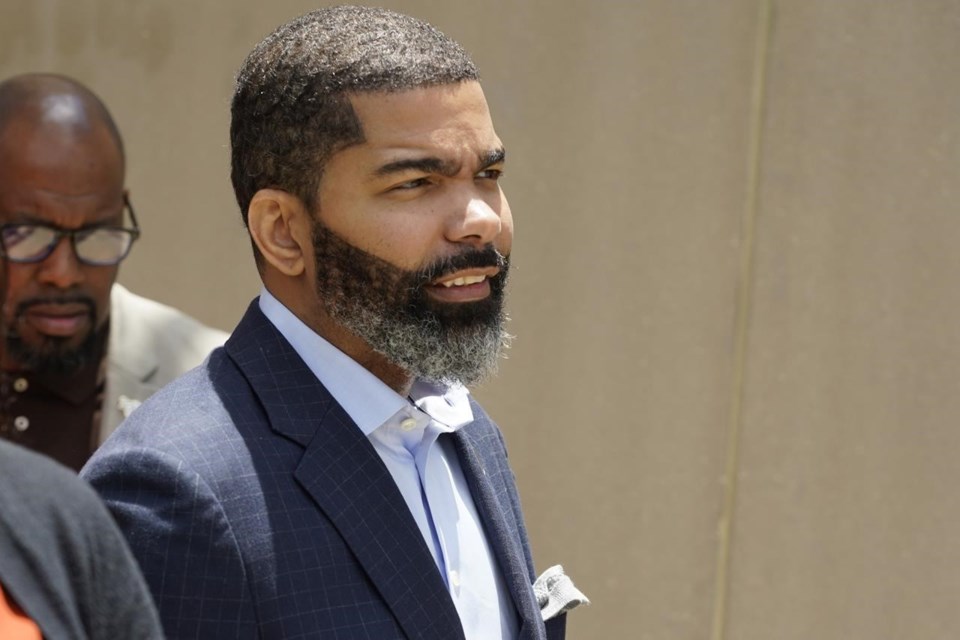JACKSON, Miss. (AP) — The water flowing from faucets in Mississippi's capital is safe to drink, city officials said in federal court Wednesday.
U.S. District Court Judge Henry Wingate ordered Jackson Mayor Chokwe Antar Lumumba and Ted Henifin, whom Wingate appointed in November to manage the city’s beleaguered water system, to appear in court because of comments Lumumba made at a June 14 news conference. Wingate was worried the mayor “may have misinformed the public" about whether Jackson's water was safe to drink, court records show.
“Not only must we address the water woes, we have to worry about instilling confidence that the water is safe to drink,” Wingate said in court Wednesday.
Jackson has struggled with water problems for decades. Most of the city lost running water for several days in August and September after heavy rainfall exacerbated problems at the city’s main water treatment plant.
At the June 14 news conference, Lumumba announced a new initiative to distribute free water filters, focusing on pregnant women and families with young children. In court Wednesday, Wingate said he became concerned at a meeting with Henifin after the news conference in which Henifin took issue with some of the mayor's comments. Specifically, Henifin said, the promotion of water filters might have implied that Jackson's water wasn't safe to drink without them.
“There is no health risk drinking the water that I'm aware of,” Henifin said. “We really need to be careful with messaging about the water.”
Henifin added that he believed all of Lumumba's comments were factual, but they might have lacked the context necessary for reassuring residents about the water's quality. Instilling confidence in Jackson's water will be harder than rebuilding the infrastructure to deliver it, Henifin said.
Lumumba stood by his comments. He pointed to guidelines on the Mississippi Department of Health's website that say any child age 5 or younger and any pregnant woman should use filtered water or bottled water for drinking and cooking. He also cited his statement at the news conference that it hadn't been “demonstrated that (Jackson's) water is dangerous.”
“I'm trying to figure out how I'm both factually correct and reckless at the same time,” Lumumba said. “Chokwe Lumumba believes our water is safe."
Both Lumumba and Henifin said the state health department sends precautionary notices to Jackson residents about water quality. The notices, which are required until the city makes certain infrastructure improvements, make it harder to rebuild trust in the water system, Lumumba and Henifin said.
On Oct. 31, the U.S. Environmental Protection Agency announced that testing had shown Jackson water is safe to drink.
Wingate said he was concerned an “unsophisticated” public might have misunderstood the mayor and come to believe that Jackson water wasn't safe.
Lumumba and Henifin both said repeatedly that Jackson's water complies with the Safe Drinking Water Act.
Wingate also peppered Henifin with questions about the city's struggling sewer system. Wingate said he plans to put the sewer system under Henifin's control as well.
On a tour of Jackson with Henifin in March, Wingate said he observed raw sewage bubbling up from the ground, including near a facility housing senior citizens.
Henifin said the city's sewage line repair trucks were unavailable because the city had yet to pay a repair shop for servicing the vehicles, Wingate said.
Wingate said he offered to pay the bill himself.
“I'll just pay the cost and live off peanut butter and jelly sandwiches,” Wingate said.
Henifin told him there were over 250 spots throughout the city where raw sewage was bubbling up through the ground.
“I don't have enough peanut butter and jelly for that,” Wingate said.
___
Michael Goldberg is a corps member for the Associated Press/Report for America Statehouse News Initiative. Report for America is a nonprofit national service program that places journalists in local newsrooms to report on undercovered issues. Follow him on Twitter at twitter.com/mikergoldberg.
Michael Goldberg, The Associated Press



